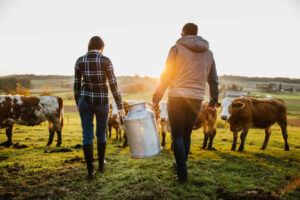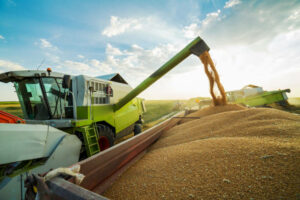The latest focused inspection initiative from the Health and Safety Executive (HSE) is part of a campaign to change Britain’s farming safety culture.
 Inspectors from Britain’s health and safety watchdog will visit farms across England, Scotland and Wales in the coming months to check for compliance with health and safety requirements and standards.
Inspectors from Britain’s health and safety watchdog will visit farms across England, Scotland and Wales in the coming months to check for compliance with health and safety requirements and standards.
The HSE says that the farming community must change their attitude towards workplace health and safety if they are to stem the tide of preventable deaths.
Data shows that people working on farms are 21 times more likely to be killed in a workplace accident than those working in other sectors.
In the last five years, 161 people have been killed on farms in Britain, including members of the public and children.
HSE inspectors to focus on main farming safety risks
Inspectors launched their wave of farming safety inspections at the end of October and will be visiting farms up until April next year to try to tackle the main causes of deaths in farming. These include working with cattle, operating and maintaining vehicles and falls from height.
 The farming safety campaign will also focus on risks to members of the public, which can include the management of cattle around public rights of way, as well as child safety on farms.
The farming safety campaign will also focus on risks to members of the public, which can include the management of cattle around public rights of way, as well as child safety on farms.
A total of 440 visits are scheduled to take place during the farming safety drive.
HSE Inspector Kathy Gostick advised farmers that the watchdog would “not only be checking farmers’ knowledge of risk but also making sure they understand their responsibility to themselves and others.”
She added: “We will look at actions they have taken to control these risks and comply with the law.”
Farmers must change attitudes towards farming safety
The HSE says the number of deaths in the agricultural sector has actually fallen by around half since the early 1980s, but the overall rate of fatalities still remains high and is much higher than in comparable industries.
The watchdog wants farmers to change how they think about farming safety.
Kathy Gostick continued:
“There are simply too many tragedies in farming and it is time for that to change.
“We are committed to making workplaces safer and healthier and that includes agriculture – we will do this by highlighting the risks, providing advice and guidance, and by holding employers to account for their actions.
“This means changing attitudes towards safety – it is the only way we will reduce the numbers of people being injured or killed.
“These upcoming inspections will help drive home the message that the only way we can bring down the numbers being injured or killed is if we change behaviour.”
Top farming safety tips
The HSE is not relying on the focused inspections alone to improve farming safety standards – they also provide advice on safe practice to key industry stakeholders, often with appearances at agricultural shows. They are also a member of the Farm Safety Partnership.
The watchdog also set out some simple actions that farmers can follow to help reduce the safety risks present when working on farms. These include:
- Ensure to comply with guidance from ‘Safe Farm, Safe Driver, Safe Vehicle’ when using and maintaining vehicles and follow ‘Safe Stop’ guidance, using adequate props during maintenance.
- Ensure you have and use good handling facilities for handling cattle and that you have considered suitable measures for protecting members of the public when cattle are kept in fields with public access.
- When it comes to work at height, avoid completing the task yourself and use a professional contractor instead. You must never use incorrect equipment for working at height – the HSE warns that using the forks or bucket of a telehandler or forklift truck to complete work at height is illegal, as is walking or working on fragile roof materials.
- Try to avoid having children on farms, but if this is not possible then ensure full and complete supervision is provided. Relevant guidance is available from the HSE.
HSE’s Your Farm – Your Future campaign was also launched earlier this year to tackle the top cause of fatalities in the agricultural sector – moving vehicles. The campaign website provides lots of advice and guidance about controlling the key risks.
Health and safety training is key
 First Response Training (FRT) is one of the UK’s largest and leading national training providers.
First Response Training (FRT) is one of the UK’s largest and leading national training providers.
They deliver a wide and diverse range of training for businesses and organisations across all industry sectors and throughout the UK. Their course range includes training in the fields of health and safety, first aid, fire safety, manual handling, mental health, food safety, health and social care and more.
Their health and safety training is mapped to current UK standards and legislation and follows HSE guidelines. It includes training awards in Health and Safety, Managing and Supervising Risk, Working at Height, Manual Handling, Accident and Incident Investigation, and more.
Based on a common sense, proportionate approach to workplace safety, training helps learners to understand the true benefits of creating a healthy and safe environment at work.
A trainer from FRT explains:
“People who work on farms are exposed to many health and safety risks; they may work with potentially dangerous machinery, vehicles, chemicals and livestock and they may carry out hazardous tasks, such as working at height or handling objects and livestock. They are also exposed to the elements, as well as a lot of noise and dust.
“It is vital, then, that farmers and farm workers are aware of the risks and how to prevent, reduce and manage them. They should be aware of their role in workplace health and safety, their legal responsibilities and the steps to take to make their work as safe as reasonably practicable.
“Suitable training is paramount to ensuring that farmers foster a positive safety culture on site and that they protect themselves and their workers from avoidable harm.”
For more information on any of the training courses that FRT can provide, please call them today on freephone 0800 310 2300 or e-mail info@firstresponsetraining.com.
